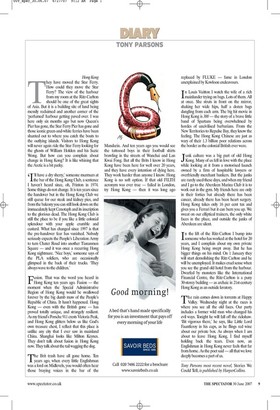DIARY
TONY PARSONS Hong Kong They have moved the Star Ferry. How could they move the Star Ferry? The view of the harbour from my room at the Ritz-Carlton should be one of the great sights of Asia. But it is a building site of land being messily reclaimed and another corner of the 'perfumed' harbour getting paved over. I was here only six months ago but now Queen's Pier has gone, the Star Ferry Pier has gone and those iconic green-and-white ferries have been shunted out to where you catch the boats to the outlying islands. Visitors to Hong Kong will never again ride the Star Ferry looking for the ghosts of William Holden and his Suzie Wong. But how can you complain about change in Hong Kong? It is like whining that the Arctic is a bit parky.
T '11 have a dry sherry,' someone murmurs at 1 the bar of the Hong Kong Club, a sentence I haven't heard since, oh, Frinton in 1974. Some things do not change. It is ten years since the handover but in the Hong Kong Club we still queue for our steak and kidney pies, and from the balcony you can still look down on the immaculately kept Cenotaph and its inscription to the glorious dead. The Hong Kong Club is still the place to be if you like a little colonial splendour with your apple crumble and custard. What has changed since 1997 is that the pre-handover fear has vanished. Nobody seriously expects the People's Liberation Army to turn Chater Road into another Tiananmen Square — and it was once a recurring Hong Kong nightmare 'Nice boys,' someone says of the PLA soldiers, who are occasionally glimpsed in the back of their trucks. 'They always wave to the children.'
Uusion. That was the word you heard in Hong Kong ten years ago. Fusion — the moment when the Special Administrative Region of Hong Kong would be swallowed forever by the big dumb maw of the People's Republic of China. It hasn't happened. Hong Kong — even with the British gone — has proved totally unique, and strangely resilient. As my friend's Porsche 911 crests Victoria Peak, and Hong Kong glitters below us like God's own treasure chest, I reflect that this place is unlike any city that I ever saw in mainland China. Shanghai looks like Milton Keynes. They don't talk about fusion in Hong Kong now. They talk about the tail wagging the dog.
The Brit trash have all gone home. Ten years ago, when every little Englishman was a lord on Midlevels, you would often hear those braying voices in the bar of the Mandarin. And ten years ago you would see the tattooed boys in their football shirts brawling in the streets of Wanchai and Lan Kwai Fong. But all the Brits I know in Hong Kong have been here for well over 20 years, and they have every intention of dying here. They work harder than anyone I know. Hong Kong is no soft option. If that old FILTH acronym was ever true — failed in London, try Hong Kong — then it was long ago replaced by FLUKE — fame in London unexplained by Kowloon endeavours.
In Louis Vuitton I watch the wife of a rich mainlander trying on bags. Lots of them. All at once. She struts in front on the mirror, shaking her wide hips, half a dozen bags dangling from each arm. The big hit movie in Hong Kong is 300 — the story of a brave little band of Spartans being overwhelmed by hordes of uncivilised barbarians. From the New Territories to Repulse Bay, they know the feeling. The Hong Kong Chinese are just as wary of their 1.3 billion poor relations across the border as the colonial British ever were.
Junk culture was a big part of old Hong Kong. Many of us fell in love with the place while looking at it from a motorised launch owned by a firm of hospitable lawyers or overfriendly merchant bankers. But the junks are rarely used these days, and when my friend and I go to the Aberdeen Marina Club it is to work out in the gym. My friends here are only in their forties but already there has been cancer, already there has been heart surgery. Hong Kong takes only 16 per cent tax and gives you a Ferrari but it can burn you up. We sweat on our elliptical trainers, the only white faces in the place, and outside the junks of Aberdeen are silent.
In the lift of the Ritz-Carlton I bump into someone who has worked at the hotel for 20 years, and I complain about my own private Hong Kong being swept away. But he has bigger things on his mind. On 1 January they will start demolishing the Ritz-Carlton and he will be unemployed. It makes cruel sense when you see the grand old hotel from the harbour. Dwarfed by monsters like the International Financial Centre, the Ritz-Carlton is a puny 30-storey building — as archaic in 21st-century Hong Kong as an outside lavatory.
The rain comes down in torrents at Happy Valley. Wednesday night at the races is where you see all the old faces. Our party includes a former wild man who changed his evil ways. Tonight he will fall off the rickshaw. 'Bit vigorous there,' he says, like Little Lord Fauntleroy in his cups, as he flings red wine about our private box. As always when I am about to leave Hong Kong, I find myself holding back the tears. Even now, an Englishman in Hong Kong never feels that far from home. As the poet said — all that we love deeply becomes a part of us.
Tony Parsons most recent novel, Stories We Could Tell, is published by HcaperCollins.


















































































 Previous page
Previous page